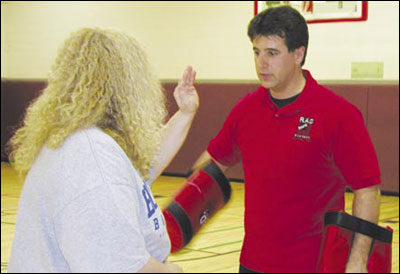Cheshire Murders Inspire Interest in Self-Defense Training for Women
| By NATALIE MISSAKIAN, Correspondent |
There was a young mom looking to protect herself and her children, a single woman fearful of evening jaunts to the supermarket, and an older lady who lived for decades on an isolated road but recently stopped feeling safe there.
These very different women, and many of the others who gathered on a recent evening in a Cheshire gymnasium, had one thing in common: the deadly home invasion that rocked their town last summer had shaken the sense of security they once took for granted.
“Obviously we live in a small town that was turned upside down,” said a 47-year-old woman whose name was withheld to protect her identity. “Being single and living by myself, you never know.”
The women are students in the Cheshire Police Department’s Rape Aggression Defense (R.A.D.) Systems course, launched by the department in March. The nationally recognized, women-only course is free to anyone 18 and over who lives or works in the town. The department received a $15,000 federal grant to cover expenses.
 Police said the demand for self-defense programs has skyrocketed since the tragic Petit murders last July, when two men killed three women in a Cheshire family after breaking into their home. The men followed the mother and one of her daughters home from a local supermarket.
Police said the demand for self-defense programs has skyrocketed since the tragic Petit murders last July, when two men killed three women in a Cheshire family after breaking into their home. The men followed the mother and one of her daughters home from a local supermarket.
“I think living in a small town, you get complacent,” said a 37-year-old mother of two small children. “You’re just thinking about the kids, putting them in the car. You’re not really thinking about your surroundings, and that’s when things go wrong.”
The trainers, Cheshire Police Officers Brian Schechter and James Nemphos, said while the course involves some simple martial arts techniques, they are not trying to turn the women into overnight black belts.
Prevention and Awareness First
The program teaches prevention and awareness first, seeking to arm women with enough strategies to avoid becoming a target. When that fails, it shows them simple techniques to help them flee a potential attacker.
Statistically, it is in a woman’s best interest to resist an aggressor, said Nemphos. A UCLA study of 94 victims of attempted sexual assault found women who did not use defensive measures such as screaming or physical resistance all were ultimately raped, he said.
The R.A.D. moves are aimed at playing up a woman’s strength, which is concentrated in her legs, hips, and abdomen. Men tend to rely more on their strong arms and chest.
“You cannot physically stand toe-to-toe with a male and hope to win that fight. Eventually, his strength is probably going to overcome you,” Nemphos told the women during a recent class. “The primary goal of R.A.D. is to escape.”
The instructors spent the first part of class discussing what-if scenarios, like what to do if you’re stopped by an unmarked police car and have doubts about the officer’s authenticity. (Answer: Call 911 to verify the traffic stop. No legitimate police officer would mind.)
Ready-to-Fight Position
After a series of warm-ups, the dozen women formed a circle around Schechter. Focusing their gaze directly at him, they swiftly turned on their feet and raised their hands into a ready-to-fight position.
“Get back!” they shouted in unison, practicing the warning stance he taught them. Then came a more insistent “No!” as the women threw fists in the air.
Next it was time to practice on the trainers. As their instructors equipped their arms with thick foam pads, the women lined up and took turns going at them, each time yelling, “No!” as they struck.
The shouting and aggressive behavior doesn’t always come easy for women, who are often socialized to be polite in tough situations, so the hands-on experience can be lifesaving.
“You’ve just started doing these strikes, and some of you are hitting very hard already,” Nemphos reassured them. “As you get more confident with the moves, the speed and power will increase.”
Confidence Booster
The last night of the five-class series is a simulation course where the instructors, dressed in full-body padded suits, “attack” the women, who must escape their advances using moves they’ve learned. It is designed to recreate the adrenaline rush of an attack.
“It’s very, very empowering,” Nemphos said. “It really lets them know what they can do, and it’s a great confidence-booster.”
R.A.D. was founded in 1989 by a Virginia police officer and has been taught to more than 300,000 women across the country. Nemphos and Schechter recently became certified trainers.
Privacy is a key aspect of the program. Participants were not permitted to reveal their identities for this article. The locations of the classes are kept secret, and the women are asked never to practice their moves at home on loved ones, since their success relies on the element of surprise and striking with intensity.
Although the R.A.D. program is offered by dozens of police departments in neighboring Massachusetts, only three other Connecticut departments – East Windsor, New Britain, and Suffield – offer the program, according to the R.A.D. Web site.
The program is also offered on several college campuses, including Fairfield University, Western Connecticut State University in Danbury, and Southern Connecticut State University in New Haven.
Positive Reviews
Although concerns about liability can be a deterrent for some police departments, Schechter said R.A.D. Systems’ credentials make it a “low-liability, court-defensible” program.
“We asked several departments about their experience with R.A.D., and it’s had very positive reviews,” he said.
One participant said she feels much safer knowing she can rely on herself instead of depending on weapons like pepper spray or Tasers, which are often buried in a woman’s purse.
“If you have a gun or a Taser or some kind of equipment, you might not have the opportunity to take it out and use it,” said the woman. “And if you’re on a plane or traveling overseas, you can’t have a gun in certain situations.”
“I think it’s a very valuable and timely course that they’re offering, and I’m glad that the Cheshire Police Department is being proactive,” she said.
Contact the author at n.missakian@thejusticejournal.com
|






